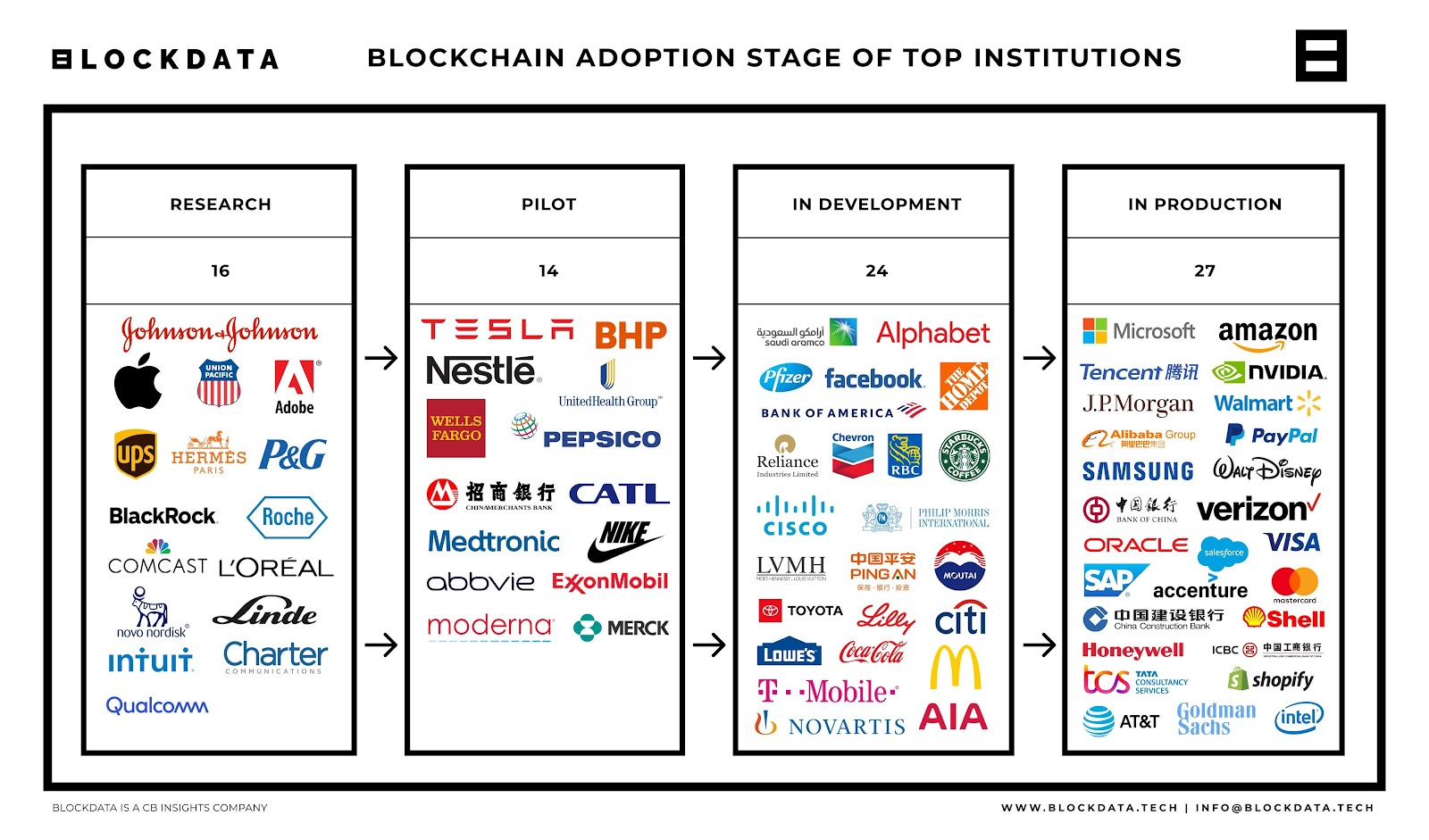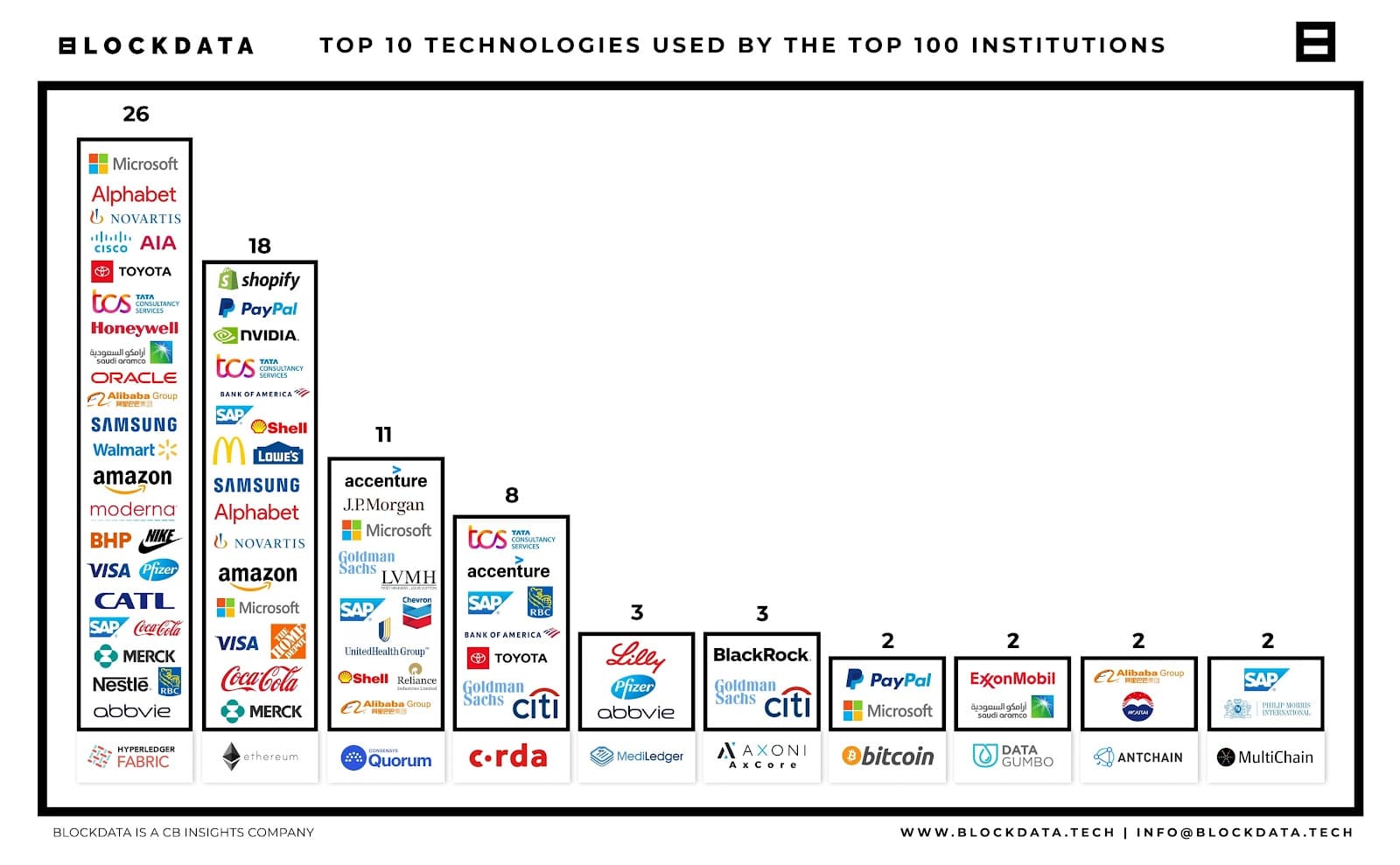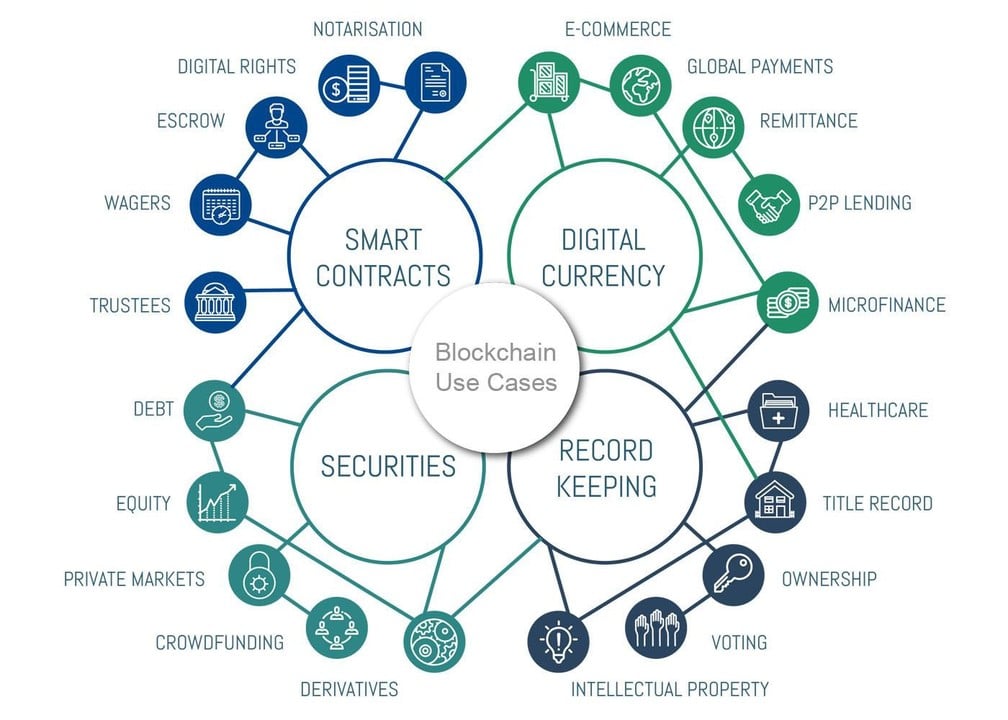As blockchain applications outside of cryptocurrencies become more evident, corporate interest in the technology is increasing. In particular, blockchain solutions have the potential to streamline supply chains, reduce costs, and increase transparency. As a result, a growing number of prominent businesses with headquarters in New York, San Francisco, Singapore, and other major hubs around the world are exploring how blockchain can be used to improve their operations.
While the full extent of blockchain’s potential is yet to be discovered, it is clear that this technology is poised to impact the business world significantly. So, here’s a list of 20 companies using blockchain technology in 2023. Without further ado, let’s dive in!
Table of Contents
- Blockchain Solutions Adoption Is Expanding
- Benefits of Blockchain Technology
- Top 20 Blockchain Companies
- Artificial Intelligence and Blockchain
- Blockchain Companies in the Cryptocurrency Market
- Bottom Line
- FAQ
- How to invest in blockchain companies?
- What are the top blockchain companies to invest in?
- Who owns blockchain technology?
- What are some publicly traded crypto companies?
Blockchain Solutions Adoption Is Expanding
Blockdata’s 2021 analysis reviewed the world’s top 100 businesses. 81 of them were found to be actively working with blockchain in three different areas: blockchain applications research, pilot or development phases, and live, in-production services used by customers, partners, and workers.

According to research, 51 of the 81 blockchain companies have advanced past the pilot stage and are either in the development phase or offer full production services. As blockchain services must deliver real business value before they can be put into production, passing through the pilot stage is seen as a substantial criterion for blockchain maturity. In addition, 27 of the top 100 public corporations have live, completely operational blockchain-based products.
11 of the top 100 publicly traded corporations are developing several blockchain-based solutions. Some of them are experimenting to find which technologies perform best, while others eventually switch to different technologies since they are better suited for their use cases.

Enterprises frequently choose Corda, Hyperledger, Ethereum, and Quorum for their blockchain space entries, and for a good reason — those enable them to create private, highly customized solutions.

The top 100 corporations began investing in blockchain as early as 2013 and continue to do so.
Between 2019 and 2021, when funding totals climbed by fourteenfold, the number of corporate-involved funding rounds increased significantly. As for favorable use cases for investing, 25 0f 100 top companies invested in their own blockchain network development — companies desire a robust infrastructure to exploit the technology because they believe in its potential. The next 3 popular investment categories consist of payment solutions (22), blockchain services (17), and trading and exchange (12).
Speaking of digital asset exchanges, Changelly offers 400+ crypto assets at fair rates and for low fees. We also aggregate offers from the best fiat gateways to help you buy digital currency like Bitcoin, Ethereum, and others. Check it out yourself!
Benefits of Blockchain Technology
Blockchain and digital economy tools offer several advantages that make the technology a highly sought-after solution across various industries:
- Decentralization. Unlike traditional centralized systems, blockchain relies on a decentralized network, eliminating the need for intermediaries and reducing the risk of a single point of failure.
- Transparency. Transactions on a blockchain are visible to all participants, ensuring transparency and fostering trust among users.
- Security. Blockchain’s cryptographic algorithms and consensus mechanisms make it highly secure and resistant to tampering and fraud.
- Efficiency. By streamlining processes and automating tasks, blockchain technology can significantly reduce the time and costs associated with transactions and data management.
- Interoperability. Blockchain technology enables seamless integration with a wide range of other systems and platforms, creating a connected blockchain ecosystem that facilitates data sharing and collaboration.
Top 20 Blockchain Companies
The companies on this list demonstrate the diverse range of applications and industries that can benefit from blockchain technology. From supply chain management, investment banking, and international trade to traceability and data security, blockchain technology has the potential to transform traditional systems and create new possibilities for businesses across the globe.

Here are the top blockchain companies that manage to make the most out of this innovative technology.
- Walmart. Walmart has been actively exploring blockchain technology for supply chain management. The retail giant’s pilot projects with IBM’s Hyperledger Fabric aim to enhance transparency, traceability, and efficiency in the food supply chain.
- Reddit. This popular online discussion platform has introduced “Community Points,” a blockchain-based rewards system that allows users to earn and spend digital assets — tokens — within specific subreddits. The system is built on the Ethereum blockchain and aims to promote user engagement and content quality.
- IBM. IBM’s enterprise-grade blockchain platform, Hyperledger Fabric, enables businesses to build private blockchain networks and streamline processes across such industries as finance, supply chain, and healthcare.
- Microsoft. Microsoft’s Azure Blockchain Service offers a fully managed blockchain platform that supports both public and private blockchains, enabling businesses to develop, deploy, and manage blockchain applications with ease.
- Maersk. Shipping giant Maersk partnered with IBM to create TradeLens, a blockchain-based platform for global supply chain management. TradeLens intends to increase transparency, efficiency, and security in international trade.
- Pfizer. Pfizer, a major player in the pharmaceutical field, has been exploring the use of blockchain for tracking prescription drugs, enhancing supply chain transparency, and combating counterfeit medicines.
- De Beers. Diamond company De Beers has developed Tracr, a blockchain-based platform that tracks diamonds from the mine to the end consumer, ensuring authenticity and promoting transparency in the diamond industry.
- HSBC. HSBC, one of the world’s largest banks, has been actively utilizing blockchain technology for various applications, such as settling foreign exchange transactions, issuing bonds, and streamlining trade finance processes.
- Unilever. Consumer goods company Unilever is utilizing blockchain for supply chain transparency and traceability, particularly in the areas of sustainable sourcing and ethical production.
- Siemens. Industrial giant Siemens is exploring the use of blockchain for energy management — namely, in the areas of decentralized energy systems and peer-to-peer energy trading.
- DHL. Global logistics company DHL is leveraging robust blockchain solutions for supply chain management with the goal of improving transparency, traceability, and efficiency in the logistics industry.
- Nestlé. Food and beverage company Nestlé has been using blockchain technology to enhance supply chain transparency and traceability, particularly for products with complex supply chains, such as coffee and infant formula.
- British Airways. British Airways has partnered with the Winding Tree blockchain company to streamline booking processes, reduce transaction costs, and enhance data security in the travel industry.
- Ford. Automotive manufacturer Ford has been exploring blockchain technology for various applications, including tracking the supply chain for ethically-sourced minerals and enabling secure data sharing between connected vehicles.
- Burberry. Luxury fashion brand Burberry is leveraging blockchain technology to combat counterfeiting, ensure the authenticity of its products, and enhance transparency in its supply chain.
- ING Bank. ING Bank has been actively experimenting with blockchain technology, with a focus on applications in trade finance, securities settlement, and regulatory compliance.
- Airbus. Aerospace company Airbus is exploring the application of blockchain technology in supply chain management, ensuring transparency and traceability of components used in aircraft production.
- Louis Vuitton. Louis Vuitton also uses blockchain to ensure the authenticity and traceability of its high-end products, helping to combat counterfeiting and protect brand value.
- Visa. Payment processing giant Visa has developed the Visa B2B Connect platform, a blockchain-based solution for facilitating cross-border business-to-business (B2B) payments. The platform seeks to make international transactions more secure, transparent, and efficient.
- Carrefour. Global retail chain Carrefour has adopted blockchain technology to enhance supply chain transparency and traceability, enabling customers to access detailed information about the origin and journey of various products, from farm to store.
Artificial Intelligence and Blockchain
AI has been rapidly gaining popularity and is sure to disrupt many industries. The convergence of artificial intelligence (AI) and blockchain technology can unlock new synergies and possibilities.
By combining the power of AI’s machine learning capabilities with the decentralized and secure nature of blockchain, businesses can create innovative blockchain applications and custom software that drive efficiency, automation, and data-driven insights. Potential use cases include:
- Fraud detection and prevention
- Smart contract automation
- Supply chain optimization
- Data analytics and predictive modeling
- Decentralized AI marketplaces
Overall, although some may see them as “competitors,” AI and blockchain technology will likely become allies in boosting the performance of companies interested in innovation.
Blockchain Companies in the Cryptocurrency Market
Although this article is mostly about the ways in which blockchain technology is able to provide various solutions to businesses in traditional markets, we should also mention the companies that take a rather direct advantage of blockchain and crypto.
There are, for example, projects like EverRise, which is a blockchain technology company that provides bridging and security solutions to various businesses. There’s also Polkadot — a crypto company that means to introduce interoperability to other chains and projects.

Some other examples include Limechain, ChromaWay, and iTechArt — the latter is a blockchain development company with a dedicated team of over 3,000 specialized engineers that helps its clients increase their security and traceability and lower costs using blockchain technology.
There are also, of course, essential members of the crypto and blockchain industry — crypto exchanges, wallets that store crypto assets, fiat marketplaces, and more. Some of these services use blockchain to improve on the models of traditional stock exchanges.

We also have to mention the projects seeking to provide alternatives to traditional financial institutions and improve crypto transactions so they could replace fiat as the primary form of payment. For example, Ripple — a crypto company with headquarters in San Francisco.
Finally, one last example we wanted to talk about is Tune.fm, one of the blockchain technology companies that use smart contracts and tokens to provide real-world solutions. Their approach allows artists to get paid directly for every second streamed.
Bottom Line
Blockchain is a digital ledger that records transactions in a secure and tamper-proof way. Once verified, the transaction is added to the blockchain and cannot be altered. This makes blockchain transactions highly secure and reliable.
Because of its potential ability to streamline processes and reduce costs, many businesses are already exploring the use of blockchain technology. Some major companies that have announced plans to adopt blockchain include IBM, Microsoft, and Facebook. A blockchain company can be anything from an investment management firm to a cloud computing provider. The technology benefits a wide range of different industries, so it’s no surprise that it is already being adopted by many major players in the United States, United Kingdom, and international markets.
While the widespread adoption of blockchain technology is still in its early stages, the interest from major public companies suggests that it could play a significant role in the business world for years to come.
FAQ
How to invest in blockchain companies?
Investing in blockchain companies can be done through various avenues, including buying stocks, purchasing exchange-traded funds (ETFs), or investing in early-stage companies through venture capital or crowdfunding platforms. When investing in blockchain companies, consider factors such as the company’s financial performance, growth potential, and market position.
Additionally, diversifying your investment portfolio by including a mix of established and emerging companies is a good strategy for managing risk. Asset management firms and industry veterans can provide valuable guidance and insights for navigating the world of blockchain investments.
What are the top blockchain companies to invest in?
While it’s important to conduct thorough research and consult with financial experts before making investment decisions, some top blockchain companies worth considering include IBM, Microsoft, Amazon Web Services, and Consensys. These companies have demonstrated consistent growth, innovation, and a strong commitment to blockchain development.
Keep in mind that investing in early-stage companies or startups may also provide high growth potential, as they often represent cutting-edge blockchain applications and solutions.
Who owns blockchain technology?
Blockchain technology is a decentralized, open-source concept that is not owned by any single entity. It was first introduced with the advent of Bitcoin in 2009 and has since evolved into a vast ecosystem of public and private blockchains, serving various purposes such as digital transactions, smart contracts, and decentralized applications. Many different developers, organizations, and communities contribute to the ongoing development and improvement of blockchain technology, fostering a collaborative and open environment.
What are some publicly traded crypto companies?
There are several publicly traded companies in the crypto space that investors can consider. These companies are often involved in the mining, trading, or development of Bitcoin and Ethereum, among other cryptocurrencies. Examples of publicly traded crypto companies include:
- Riot Blockchain. A blockchain development company involved in Bitcoin mining and the support of the broader blockchain ecosystem.
- Bitfarms. A Bitcoin mining company with operations in multiple countries, focusing on sustainable energy sources for its mining facilities.
- Voyager Digital. A cryptocurrency trading platform that offers commission-free trading and access to various digital assets.
When investing in publicly traded crypto companies, it’s essential to contemplate the inherent risks and volatility associated with the cryptocurrency market. Consulting with financial experts and diversifying your investment portfolio can help manage potential risks.
Disclaimer: Please note that the contents of this article are not financial or investing advice. The information provided in this article is the author’s opinion only and should not be considered as offering trading or investing recommendations. We do not make any warranties about the completeness, reliability and accuracy of this information. The cryptocurrency market suffers from high volatility and occasional arbitrary movements. Any investor, trader, or regular crypto users should research multiple viewpoints and be familiar with all local regulations before committing to an investment.










